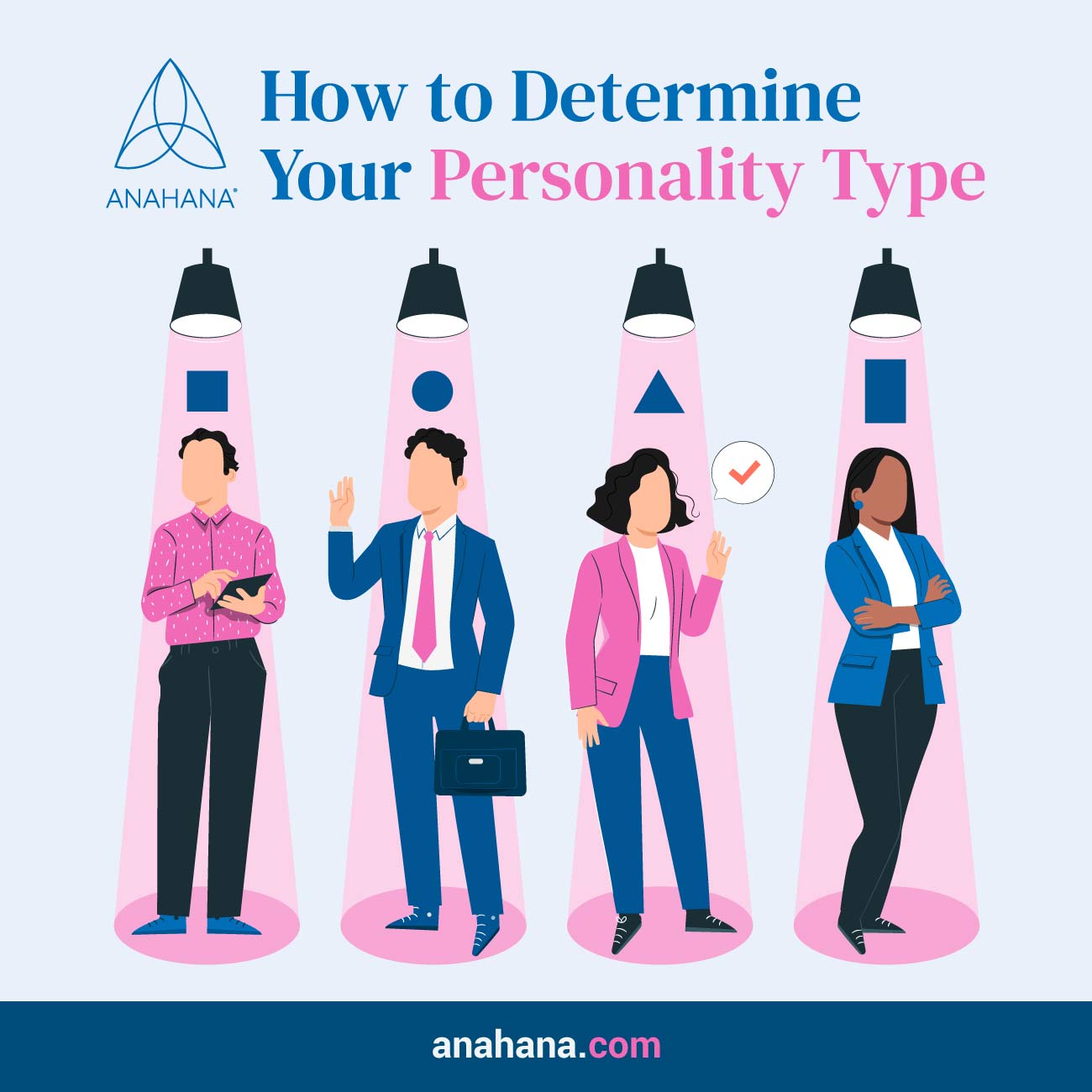
Table of Contents
Imagine walking into a room where every person you meet represents a distinct world of thoughts, motivations, and reactions – welcome to the diverse landscape of the four personality types. Each type offers a unique lens through which people view and interact with the world.
From Type A's goal-driven dynamism to Type B's creative calm, the analytical depth of Type C, and the sensitive realism of Type D, in this blog post, we uncover which type resonates with you and gain insights into managing relationships and career paths with a deeper understanding of these personality frameworks.
4 Personality Types Explained
The Four Personality Type Theory is a psychological framework that categorizes individuals into four distinct groups based on their predominant behavioral and emotional traits.
Rooted in an ancient medical concept, the theory has evolved, intertwining with the theory of the four temperaments—sanguine, choleric, melancholic, and phlegmatic temperaments.
These temperaments were historically believed to be determined by the balance of bodily fluids: blood, yellow bile, black bile, and phlegm.
In a modern interpretation, the theory simplifies the understanding of complex human behaviors by categorizing personalities into four types: A, B, C, and D. Each type represents a cluster of characteristics and tendencies.
For example, Type A individuals are often goal-oriented and competitive, while Type B personalities tend to be more relaxed and creative. Type C people are generally detail-oriented and logical, whereas Type D personalities might tend to worry and pessimism.
Though simplified, this theory offers valuable insights into personal and interpersonal dynamics. It aids in self-awareness, improving communication, and fostering better relationships.
As a foundational concept in personality psychology research, it not only helps in personal development but also finds application in fields like team building and leadership training; the topic is generating enthusiasm in different fields.
Type A Explained
Type A personality is often seen as the archetype of ambition and competitiveness. Individuals with this personality type are usually goal-oriented and driven, thriving in environments that challenge them to excel. Their perseverant nature helps them not lose interest easily.
When people fall into this type, they often approach tasks urgently and are known for their high-achieving nature.
Personality tests that assess Type A traits typically measure factors like time urgency, competitiveness, and a strong drive for success. At the same time, they can be seen as self-centered and narcissistic.
Type A Strengths
- Goal-oriented: They set high standards and work tirelessly towards their objectives.
- Efficient: Known for their ability to manage time effectively and stay productive.
- Leadership Qualities: Often take charge in group settings, showing strong leadership skills.
Consider a character like Miranda Priestly from "The Devil Wears Prada." She epitomizes the Type A personality with her high standards, competitive nature, and relentless drive for excellence in the fashion industry.
Type A Weaknesses
- Stress Management: Their intense lifestyle can lead to high stress levels.
- Impatience: They may become easily frustrated with delays or obstacles.
- Risk of Burnout: The constant drive for achievement can lead to exhaustion and burnout.
Type B Explained
Type B personality is the counterbalance to Type A, known for its relaxed and laid-back nature. These individuals are often seen as easy-going and adaptable, handling stress better than their Type A counterparts.
They are creative thinkers who prefer leisurely exploring new ideas, theories and concepts. They prefer to do things in their own way. Personality tests highlight low-stress levels, a calm demeanor, and a creative approach to problem-solving in Type B individuals.
Type B Strengths
- Creativity: Excel in thinking outside the box and generating new ideas.
- Stress Management: They maintain a calm and composed demeanor in stressful situations.
- Adaptability: Can easily adjust to changes and new environments.
Think of Bob Ross, the iconic painter known for his calm demeanor and encouraging phrases. His relaxed approach to teaching art, emphasizing enjoyment over perfection, perfectly showcases Type B personality's creative and stress-managing traits.
Type B Weaknesses
- Procrastination: Their relaxed nature can sometimes lead to delays in completing tasks.
- Less Goal-Oriented: They might need more intense focus and drive, as seen in Type A personalities.
- Conflict-Avoidance: Tendency to avoid confrontations, which can lead to unresolved issues.
Type C Explained
A detail-oriented, analytical approach to life characterizes Type C personality. People with a Type C temperament are often methodical logical, and hold themselves and others to high standards.
They thrive in environments where precision and accuracy are valued and are typically cautious in their decision-making process. A key aspect of Type C is their focus on facts and data, making them excellent problem solvers and critical thinkers.
Type C Strengths
- Attention to Detail: Exceptional ability to notice and manage intricate details.
- Analytical Thinking: Skilled at analyzing situations and data to make informed decisions.
- Reliability: Known for their consistency and dependability in personal and professional settings.
Sherlock Holmes, the fictional detective, is a classic representation of a Type C personality. His meticulous attention to detail, analytical mind, and methodical approach to solving mysteries demonstrate the key characteristics of Type C.
Type C Weaknesses
- Over-Critical: Can be overly critical of themselves and others, leading to stress.
- Resistance to Change: May struggle with adapting to new situations or ideas.
- Emotional Suppression: Tend to suppress emotions, which can affect their mental health and relationships.
Type D Explained
Type D personality, often identified through personality assessments, is marked by a tendency towards negativity and pessimism. Individuals with this temperament are typically risk-averse and may have developed a gloomier outlook on life.
They are prone to experiencing emotions like worry, sadness, and anxiety more frequently than other personality types, and these emotions negatively affect their life. Despite these challenges, Type D personalities can offer unique strengths and perspectives.
Type D Strengths
- Empathy: Highly empathetic, understanding and relating to others' feelings.
- Thoughtfulness: Deep thinkers who often consider the long-term implications of actions and decisions.
- Risk Awareness: Their risk-averse nature can be beneficial in avoiding potential problems.
Type D Weaknesses
- Pessimism: Tendency towards a negative outlook can impact motivation and happiness.
- Social Withdrawal: May withdraw from social interactions to avoid potential stress or rejection.
- Resistance to Positive Change: Sometimes, their cautious nature hinders embracing beneficial changes.
Eeyore from "Winnie the Pooh" is a character that reflects many Type D traits. His generally gloomy outlook and tendency to expect the worst is characteristic of the Type D temperament, though he also shows deep empathy towards his friends.
How to Determine Your Personality Type

Determining your personality type begins with self-awareness and a willingness to explore your traits and behaviors. One of the most effective tools for this exploration is a personality test.
These tests are designed to ask questions that analyze and describe your behavior, preferences, and reactions to different situations.
The results can provide a comprehensive overview of your dominant personality traits, helping you understand whether you align more with Types A, B, C, or D.
Beyond formal assessments, observing your reactions and choices in daily life can be enlightening. Reflect on examples of how you handle stress, interact in social situations, approach problem-solving, and manage your emotions.
Comparing these observations to the characteristics of the four personality types can offer further insights. Remember, most people exhibit a blend of these types, so don't be surprised if you find aspects of several types in yourself.
Takeaway: Embrace Your Personality
Embracing your personality type is crucial for personal growth and happiness. Understanding your unique traits - whether you're goal-oriented like Type A, creative like Type B, analytical like Type C, or empathetic like Type D - empowers you to leverage your strengths and work on your weaknesses.
Acknowledging and accepting these traits can enhance self-awareness, improve relationships, and guide career choices.
Incorporating this knowledge into your life opens the door to new ideas and approaches tailored to your personality. It helps set realistic expectations for yourself and find environments where you can thrive.
Remember, every personality type has its value and beauty. Celebrating your individuality and the diverse qualities you bring to the table is key to personal fulfillment and enriching the lives of those around you.
Frequently Asked Questions
Can individuals exhibit traits from multiple personality types (A, B, C, D)?
Yes, it's common for individuals to exhibit traits from multiple personality types. While a person may predominantly identify with one type, such as Type A or Type B, they can also possess qualities from other types.
This combination of traits makes each individual’s personality unique. Understanding this blend can provide a more nuanced view of oneself and others, enhancing self-awareness and interpersonal relationships.
Are certain personality types (A, B, C, D) more suited to specific career paths?
Certain personality types may naturally gravitate towards career paths that align with their inherent traits.
For instance, Type A individuals might excel in high-pressure, goal-oriented environments, making them suitable for leadership or entrepreneurial roles.
Conversely, Type B personalities may succeed in creative or flexible job settings. However, it's important to note that personal interest and aptitude play significant roles, and individuals of any personality type can thrive in various careers.
Is one personality type better than the other?
No personality type is inherently better than another. Each type has unique strengths and weaknesses; what matters most is how individuals leverage these to their advantage.
A balanced approach, recognizing the value of four different personality types and traits, is crucial.
Combining various personality types can lead to a richer, more productive environment in diverse settings like workplaces or personal relationships. Embracing and appreciating these differences is key to personal and collective growth.
How accurate is a personality assessment in determining personality types?
Personality assessments can be a useful tool in identifying your dominant personality traits. However, it's important to approach these tests with the understanding that they provide a general overview rather than a definitive categorization of one's personality.
Factors such as the specific methodology of the test, the context in which it's taken, and the individual's self-awareness can influence the results at the same time.
Therefore, while these assessments can offer valuable insights, they contribute to a comprehensive understanding of one's personality.
References
The 4 Different Personality Types | Thomas.co
Type A B C D Personality Test - wikiHow
Personality Types A B C & D Explained - Which One Are You? - PersonalityTests.com
Disclaimer
The contents of this article are provided for informational purposes only and are not intended to substitute for professional medical advice, diagnosis, or treatment. It is always recommended to consult with a qualified healthcare provider before making any health-related changes or if you have any questions or concerns about your health. Anahana is not liable for any errors, omissions, or consequences that may occur from using the information provided.

By: Lujayn Mostafa
Lujayn (Lulu) is a Anahana writer and editor as well as a soon to be a graduate of the M.Ed. in Developmental Psychology and Education program at OISE, University of Toronto. She holds a B.A. in Psychology from The American University in Cairo, with a double minor in Anthropology and Educational Studies.
